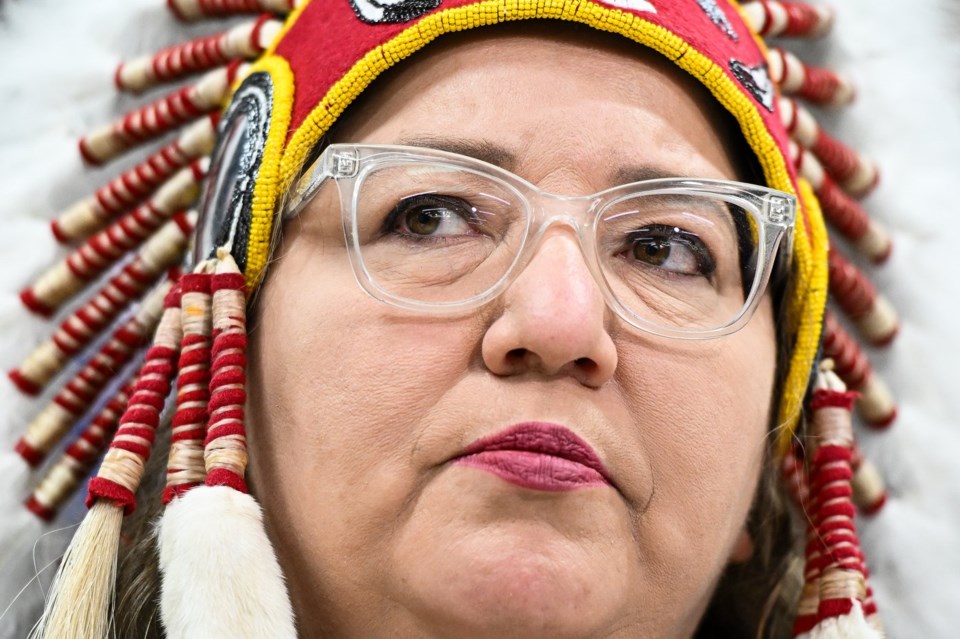OTTAWA — The Assembly of First Nations' annual general meeting next week in Winnipeg will set the stage — and the tone — for engaging with governments on major infrastructure projects.
National Chief Cindy Woodhouse Nepinak says politicians will be paying close attention to the resolutions chiefs pass related to the federal major projects legislation. The bill, which passed in June, has seen strong opposition from some First Nations leaders and community members who fear it won't respect their rights.
"We look forward to that — to hearing leadership debate, discuss and advance to the next steps," she said in an interview.
The annual general assembly that kicks off on Sept. 3 will be the first time the AFN, which advocates on behalf of more than 600 chiefs, is handed a formal mandate to respond to governments on this issue on behalf of First Nations.
Provinces have enacted similar legislation to fast-track major projects in an effort to shore up the Canadian economy amid U.S. President Donald Trump's tariff regime.
One draft resolution calls for First Nations infrastructure projects to be included in the national push for major projects. Another urges amendments to the federal legislation on language around free, prior and informed consent and joint decision-making authority with First Nations governments.
"We expect the government to honour their promises and ensure that First Nations are properly consulted on these matters," Woodhouse Nepinak said.
"Major projects cannot proceed on the lands and waters of First Nations without our free, prior and informed consent."
Woodhouse Nepinak said the AFN has invited federal ministers to attend, including Crown-Indigenous Relations Minister Rebecca Alty and Northern and Arctic Affairs Minister Rebecca Chartrand.
Chartrand and Alty's offices did not immediately confirm if they will attend.
Manitoba Premier Wab Kinew is slated to attend the gathering, according to a provisional agenda shared by the AFN which shows he will be delivering opening remarks Wednesday.
The federal government announced its new major projects office would launch this week, which includes an Indigenous advisory council.
Woodhouse Nepinak said information on the major projects office has not yet been shared with the AFN, nor does it have details on who would be staffing the advisory council.
Other resolutions up for debate include a call for immediate federal intervention to address the drug crisis in First Nations communities by declaring a First Nations-wide state of emergency and for the federal government to commit resources to address the root causes of addictions.
Another is calling for the AFN to help the Federation of Sovereign Indigenous Nations obtain a legal opinion on Aboriginal and treaty rights to cross-border trade, and for Canada to formally enshrine those rights into trade policy and legislation.
This assembly will also see child welfare reform talks reignited after chiefs last year voted down a national, 10-year, $47.8 billion agreement with Canada to reform the system after the Canadian Human Rights Tribunal ruled Ottawa's underfunding of the on-reserve system was discriminatory in 2016.
Chiefs voted last October to create a new body to negotiate on behalf of First Nations, and for a new legal team to represent them.
The Tribunal ruled this month that the negotiations that have met an impasse should resume, and that should Ottawa refuse, parties involved in the case can present it with an evidence-based reform plan of its own.
One resolution being brought forward by Chief Leroy Denny of Eskasoni First Nation is calling for the AFN to urge Ottawa back to the table, and for it to provide regions with the resources needed to properly consult with their member First Nations on the way forward in regional agreements.
It also calls on Ottawa to include a "most favourable terms" clause in all regional agreements that would ensure if one region secures more than another, other regions can adopt those aspects if they so choose.
This report by The Canadian Press was first published Aug. 28, 2025.
Alessia Passafiume, The Canadian Press




